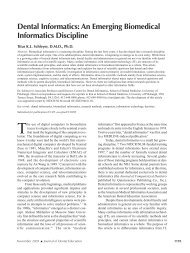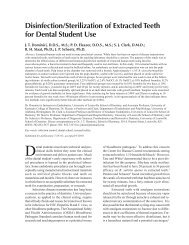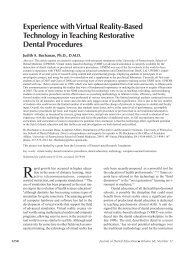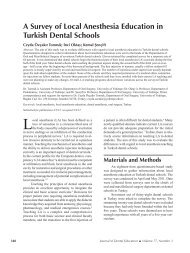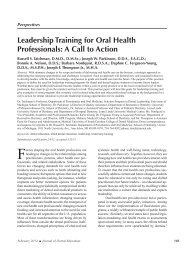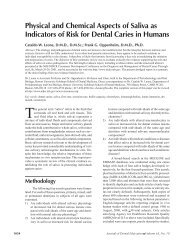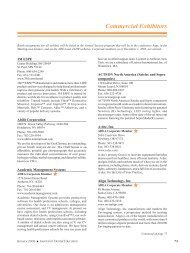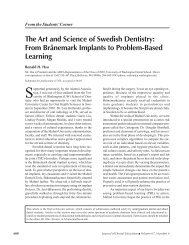List of Poster Presentations - Journal of Dental Education
List of Poster Presentations - Journal of Dental Education
List of Poster Presentations - Journal of Dental Education
You also want an ePaper? Increase the reach of your titles
YUMPU automatically turns print PDFs into web optimized ePapers that Google loves.
<strong>Poster</strong> Abstracts<br />
good quality study materials. The web site is also used for clinical<br />
examination in orthodontic courses. The effectiveness <strong>of</strong> the webbased<br />
digital records in providing relevant information to students in<br />
comparison to the traditional records was evaluated by a randomized<br />
controlled trial involving 99 second-year dental students. One group<br />
(50 students) studied two cases from the web site; the other group<br />
(49 students) studied the same two cases from traditional orthodontic<br />
records. Effectiveness was assessed by comparing test scores and the<br />
time spent to complete the tests by way <strong>of</strong> t-statistics. Both for test<br />
scores and times, there were no significant differences between means<br />
for the two study groups. Attitudes <strong>of</strong> students towards the web site,<br />
assessed from post-test questionnaires, were positive. In conclusion,<br />
for orthodontic diagnosis, digital orthodontic records appear to be<br />
comparable to conventional records. The method is an efficient way<br />
to generate, store, and edit orthodontic records for teaching and clinical<br />
examination. In the present study web-based orthodontic study cases<br />
were preferred as an adjunctive tool to conventional teaching.<br />
84. Going Mobile: Providing a Platform to Enhance<br />
Student-Faculty Resources and Communications<br />
Karimbux, Nadeem, Harvard School <strong>of</strong> <strong>Dental</strong> Medicine, Howell,<br />
Howard, Harvard School <strong>of</strong> <strong>Dental</strong> Medicine, Don<strong>of</strong>f, Bruce, Harvard<br />
School <strong>of</strong> <strong>Dental</strong> Medicine, Halamka, John, Harvard Medical School<br />
The purpose <strong>of</strong> this project is to compare several outcomes prior<br />
to and during the introduction and implementation <strong>of</strong> the MyCourses<br />
platform.<br />
Recent reports have reported a crisis in <strong>Dental</strong> <strong>Education</strong><br />
regarding the shrinking pool <strong>of</strong> faculty. In response to this crisis, dental<br />
schools are developing or purchasing information technology tools<br />
to deliver curriculum content and to monitor student progress. The<br />
MyCourses Mobile Platform has been developed for medical, health<br />
science and technology and dental courses at the Harvard Medical<br />
School (HMS), and the Harvard School <strong>of</strong> <strong>Dental</strong> Medicine (HSDM).<br />
The platform gives students immediate access ( via computers or<br />
hand held devices) to personalized course calendars, announcements,<br />
and resources such as class notes and syllabi. Mobile devices also<br />
enable better communication between students and faculty. This<br />
presentation will display the process to digitize materials, provide<br />
faculty development and examples <strong>of</strong> the MyCourses platform. As a<br />
part <strong>of</strong> this project, course evaluations for the last six years (cohort<br />
that has not used MyCourses; n=153) at HSDM were analyzed. Using<br />
a scale <strong>of</strong> 1-5 (1=very poor to 5=excellent), the following results<br />
were generated: Accessibility <strong>of</strong> faculty: 4.32; Library facilities/<br />
Services; 3.66; Computer Resources: 3.34; Content <strong>of</strong> Courses: 3.78.<br />
When comparing the Classes <strong>of</strong> 1996-1998 (n=80) with the Classes<br />
<strong>of</strong> 1999-2001 (n=73), the accessibility <strong>of</strong> faculty dropped from 4.76<br />
to 3.65 . Our hypothesis is that the MyCourses platform will improve<br />
all <strong>of</strong> the above outcomes by allowing students immediate access to<br />
course materials, library materials and faculty resources. For example,<br />
using personal digital assistants (PDAs), students can log casebook<br />
procedures and observations (either at the HSDM, or at externships<br />
and rotations) which they can upload to a central computer for the<br />
faculty to easily retrieve and review.<br />
A centralized platform has been developed to serve as a<br />
repository for curriculum content and resources, that can be accessed<br />
by students and faculty wherever and whenever they want. The impact<br />
<strong>of</strong> the MyCourses on these outcomes will continue to be analyzed as<br />
students are exposed to and start to use this platform to access<br />
resources and to communicate with faculty.<br />
85. Dentists’ Opinions about Undergraduate Clinical<br />
Supervision<br />
Kay, Charles J., Shapiro Developmental Center<br />
The purpose <strong>of</strong> this study was to determine, in the opinion <strong>of</strong><br />
general dentists and dental specialist, what aspects <strong>of</strong> clinical<br />
supervision <strong>of</strong> undergraduate dental students can be performed by a<br />
well experienced general dentist.<br />
Seventy eight dentists were surveyed (42 general dentists, 38<br />
dental specialist). They were asked if a well experienced general dentist<br />
(with a specifically defined educational and experience background)<br />
could adequately supervise certain dental procedures commonly<br />
performed by undergraduate dental students. A list <strong>of</strong> 40 <strong>of</strong> the most<br />
commonly performed procedures by undergraduate dental students<br />
was generated which included aspects <strong>of</strong> oral surgery, periodontics,<br />
prosthodontics, pedodontist, endondontics, restorative dentistry, and<br />
adjunct procedures.<br />
100% <strong>of</strong> those surveyed indicated that it was suitable for a well<br />
experienced general dentist to supervise at least some <strong>of</strong> the procedure<br />
listed. 73% <strong>of</strong> the dentists indicated that all <strong>of</strong> the listed procedure<br />
could be adequately supervised. Of the remaining 27% <strong>of</strong> dentists,<br />
on average they felt that 94% the procedure could be adequately<br />
supervised by a well experienced general dentist. There was no<br />
statistical difference between the responses <strong>of</strong> general dentists and<br />
specialists when all specialist were grouped together . Subgroups <strong>of</strong><br />
specialist showed differences in their responses These results show<br />
that the great majority <strong>of</strong> the surveyed dentists , both general dentists<br />
and specialist, feel that it is appropriate for a well experienced general<br />
dentist to supervise the majority <strong>of</strong> clinical procedures performed by<br />
undergraduate dental students. As a large portion <strong>of</strong> most dental<br />
faculty time is spent clinically supervising undergraduate dental<br />
students and it is becoming increasingly difficult to recruit dental<br />
specialist to dental education, these results may have implications<br />
with regard to alternate avenues for locating faculty who can<br />
adequately supervise undergraduate dental students.<br />
These results show that the great majority <strong>of</strong> the surveyed<br />
dentists , both general dentists and specialist, feel that it is appropriate<br />
for a well experienced general dentist to supervise the majority <strong>of</strong><br />
clinical procedure performed by undergraduate dental students.<br />
86. DentSim Virtual Reality in Preclinical Operative<br />
Dentistry to Improve Psychomotor Skills - A Pilot Study<br />
Urbankova, Alice, Columbia University School <strong>of</strong> <strong>Dental</strong> and Oral<br />
Surgery, Lichtenthal, Richard M., Columbia University School <strong>of</strong><br />
<strong>Dental</strong> and Oral Surgery<br />
Purpose: To determine the efficacy <strong>of</strong> the DentSim computer<br />
assisted simulation system in improving the quality <strong>of</strong> the technical<br />
ability <strong>of</strong> students at varying levels <strong>of</strong> skill in the performance <strong>of</strong><br />
operative procedures assessed by their performance in practical<br />
examinations as part <strong>of</strong> the preclinical operative dentistry curriculum<br />
at Columbia University.<br />
Thirty students were chosen randomly from the second year<br />
class in pre-clinical operative dentistry. Based on their average<br />
performance in their previous practical examinations, they were<br />
divided into three groups: unacceptable, acceptable and excellent.<br />
Each group consisted <strong>of</strong> ten students. Five students in each group<br />
were randomly assigned to the DentSim training group and five to<br />
the control group. The instruction for the DentSim training group<br />
consisted <strong>of</strong> a one hour introduction followed by ten hours <strong>of</strong> faculty<br />
assisted training, performing Class I and Class II cavity preparations.<br />
The training group also had access to the DentSim during their free<br />
time and on weekends.<br />
The hypothesis being evaluated was that the students using the<br />
DentSim technology would improve their performance in the practical<br />
preclinical examinations to a greater, discernable degree than those<br />
in the control group who did not have access to this technology.<br />
284 <strong>Journal</strong> <strong>of</strong> <strong>Dental</strong> <strong>Education</strong> ■ Volume 66, No. 2



